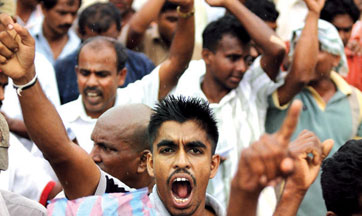Strikes on the decline- Verité
An analysis of strikes in the past decade, conducted by Verité
Research, identifies two key trends.
There is a general downward trend in the number of strikes recorded
over the last decade but also a departure from this trend in the last 12
months.
 A recent strike to gain widespread media attention was the islandwide
strike launched on May 11 by the powerful health sector union,
Government Medical Officers'Association (GMOA), which was called off
after arriving at an agreement with the ministries with regard to their
demands. A recent strike to gain widespread media attention was the islandwide
strike launched on May 11 by the powerful health sector union,
Government Medical Officers'Association (GMOA), which was called off
after arriving at an agreement with the ministries with regard to their
demands.
Additionally, the non executive staff of the Ceylon Electricity Board
(CEB) on May 29 and the non academic staff of state universities in Sri
Lanka 48-hour token strike on May 22 are some of the most recent
strikes.
The basis of the GMOA ,CEB and the State Universities non academic
staff action, relating to higher remuneration, is similar to that of
many other union actions in the past few months –the recent sharp
increases in prices being a common factor that have lent legitimacy for
these demands.
In the last year there has been an increase in the number of strikes
which is a departure from the general downward trend observed in the
past few years.In the context of the past 10-year period the prevalence
of strikes by private-sector workers and those of semi-government
institutions (a broad classification that covers a myriad institutions
ranging from the Ceylon Petroleum Corporation to the Sri Lanka Ports
Authority) has generally declined.
During this period the highest record of 104 strikes in 2002 is
followed by a steady decline over a period of 5 years where 2007
recorded only 25 strikes. This amounted to a 76 percent decline in the
number of strikes over these five years. Excluding a sudden increase in
2008, where the number of strikes doubled from 25 in 2007 to 51, this
downward trend has continued in 2009 where only eight strikes were
recorded. However, recently, yet another spike in the number of strikes
is to be noted.
Within the last year, the number of strikes rose to 27 which is more
than three times the number of strikes held in 2009. The demands laid on
the table at the recent GMOA strike were in relation to financial
benefits due to the workers; a theme prevalent throughout many other
strikes in the last year.
Increase in salaries, payment of additional allowances was the main
demand in approximately 40 percent of the strikes carried over the
recent period of increased strikes.
The intensification of both strikes and other trade union actions
could be seen around midyear last year, some of the most prominent being
the work-to-rule action by the Federation of University Teacher’s
Association (FUTA) in May 2011 followed soon after by various unions
such as the CEB union and the Sri Lanka Telecom trade unions demanding
payment of salary arrears exemplifies several strikes in relation to
such financial benefits.
However, the demands that prompted other strikes within the last year
pertain to a range of objectives from demanding the arrest of a suspect
in the death of a doctor in a road accident,to a request for recruiting
of new workers, protesting pension schemes and even protesting the
removal of the Post Master General who had been accused of massive
corruption.
The most recent strike carried out by trade unions in five banking
sectors called for the resignation of the National Savings Bank Chairman
Pradeep Kariyawasam, over a controversial share transaction amounting to
Rs.390m. Strikes or other trade union actions action in such
circumstances have not been limited to wage negotiation or other
economic motivations.
There is a wider array of motivations, in areas of governance and
social justice, for which collective bargaining is being utilised in Sri
Lanka.
The use of collective bargaining in this manner is significant as it
can be viewed as both a reassertion of the power of unions and their
loss of faith in resolving not only economic grievances but also issues
relating to institutional performance through negotiation.
|

